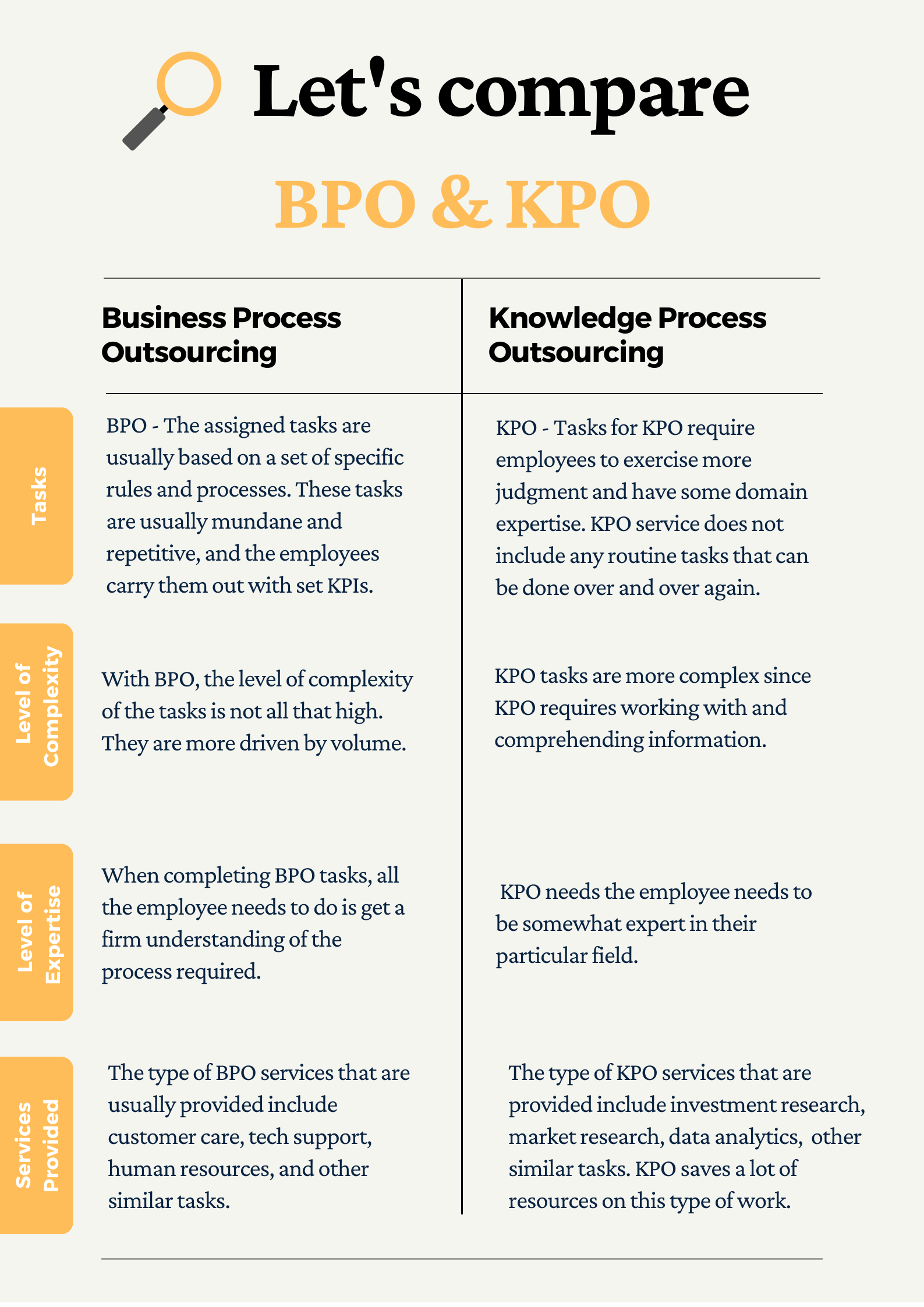If you’re considering outsourced services, you might be wondering whether a BPO or KPO is best for your organization. In this post, we explore the concepts of BPO and KPO and discuss the key differences between the two. BPO and KPO are two types of outsourcing that companies often employ, particularly when it comes to calling center operations. While BPO call centers handle processes on behalf of a client, KPO call centers are involved in the handling of information, knowledge, or data on behalf of a client company. KPO is an offshoot of BPO, and it’s utilized often when an organization requires a high level of specialized expertise. Here’s what you need to know about BPO and KPO.
Before we get into all of the differences, let’s take a look at what KPO BPO is, so we are all on the same page.
What is BPO?
BPO or Business Process Outsourcing is a branch of outsourcing. It involves contracting out any function/segment/process to a third-party service provider. It can broadly be classified into back office and front office outsourcing. Back office outsourcing includes business functionalities such as accounting, finance, or human resources. Front office outsourcing involves customer-related services such as contact/call center services. As the name suggests, it is a process, an operation that is proven and predetermined. The executor of the process has to ensure that all procedures are executed in a consistent and efficient manner, no matter where it is located in the world. Some popular BPO tasks include:
- Call Center Outsourcing
- Data Entry Processing
- Financial BPO Outsourcing
- Healthcare BPO Outsourcing
Types of BPOs
The types of BPOs can be broken down into three categories:
- On-shore BPO – When a company outsources services to another company within the country.
- Nearshore BPO – When a company outsources services to another company located in a nearby country.
- Offshore BPO – When the company does outsourcing services to another company located overseas.
Benefits of BPO
Businesses choose to outsource processes for several reasons. There are plenty of reasons why businesses outsource processes. Benefits of BPO include:
- Lower costs – Outsourcing reduces costs for labor, generally when it comes to staffing and training. It reduces office space costs because the business doesn’t have to accommodate the employees.
- Contrate of core functions – By outsourcing, companies can focus their resources on the main business functions. They won’t have to stress about how well the bookkeeper and accountant are doing their jobs. Instead, they can focus on tasks that set them apart from the competition.
- Enhanced flexibility – A company that outsources functions can act faster and efficiently when it comes to risk management for adding new offerings to customers. These companies can also adjust their internal resources so that more critical functions are covered effectively.
What are the Challenges of BPO?
One of the biggest challenges is choosing the right BPO partner. CFOs and CIOs who spend a bit more time on the bidding process have fewer problems after services are initiated. According to research from Deloitte, 28% of companies with outsourcing partners said they could have avoided certain issues by understanding the value of a Request for Information (RFI). An RFI is used to evaluate how a vendor, in this case, an outsourcing partner, will provide a platform to deliver quality service. It’s a useful tool to help you narrow down your choices to only those BPO providers that have the potential to meet your needs.
Companies may also encounter some communication difficulties. Communication has long been an issue in outsourcing. Although many companies have developed departments like the Vendor Management Office (VMO), which have improved communications with their BPO providers, CEOs still consider outsourcing a business risk and liability due to the communication challenges. During the vetting process, evaluate whether the provider is asking the right questions. Are they listening? In their proposals and presentations, do they understand your business challenges? Ask for details on their communication and escalation processes, as well.
What is KPO?
Knowledge process outsourcing (KPO) is the outsourcing of core, information-related business activities. KPO involves contracting out work to individuals that typically have advanced degrees and expertise in a specialized area. The information-related work can be carried out by workers in a different company or by a subsidiary of the same organization. The subsidiary may be in the same country or in an offshore location to save costs or other resources.
An example of KPO would include the following:
- Business Research
- Legal Process Outsourcing
- Market Research
- Writing and Content Development
Types of KPOs
Knowledge Process Outsourcing is an umbrella term for different types of activities. Since the services range from skilled labor to expertise, they can be further classified. Here are the four main types of KPO:
- Data Analytics – Data analytics is the process of modeling, cleaning, examining, and altering an organization’s data to segregate useful information. It helps organizations make sound strategic decisions by suggesting relevant and helpful conclusions.
- Market Research – Market research lets businesses test the waters through surveys conducted beforehand. It tells them whether a product or service will attract customers or not.
- Global Reporting and Performance Management – They help achieve increased productivity and operational excellence by providing performance measurement and efficient reporting across industries.
- Data Management – Data management refers to the practice of collecting, storing, and using data efficiently, cost-effectively, and securely. There is a broad range of practices, procedures, tasks, and policies involved in digitally managing data in an organization.
Benefits of KPO
KPO can help companies reduce operational or production costs by creating new processes or streamlining efficiency. KPO also fills the gap or need for skilled employees in a particular field. KPO also frees up existing staff, including management, to do other work, boosting efficiency and productivity. The flexibility that comes with KPO allows a company to increase or reduce staff easily. For example, if economic conditions worsen, a company can easily reduce its KPO staff to cut costs. Conversely, a company can quickly hire specialized staff to boost profits or revenue. KPO helps a company to be more nimble and adapt to the changes in its industry and competitive landscape.
What are the Challenges of KPO?
There are several challenges facing the KPO industry. Some of them are maintaining higher quality standards, investment in KPO infrastructure, the lack of talent pool, requirement for a higher level of control, confidentiality, and enhanced risk management. There are additional problems such as:
- Manpower and Knowledge Issues – A KPO professional requires possession of the right skill-sets and domain knowledge. Therefore, access to a large, high-quality skill pool (in diverse fields such as law, patents, economics, management, finance, and engineering) is a precondition for successful KPO operations.
- Industry and Business Understanding – A thorough understanding (of the businesses and processes executed within the KPO domain) is required to execute the knowledge-based assignments successfully.
- Concerns over Data Security: According to industry sources, KPO units are privy to information not otherwise available in the public domain. At times, clients hesitate to offshore any sensitive or confidential data to any third-party service provider.
Now that we have an overview of KPO and BPO let’s get into some of the KPO BPO differences.
Difference Between KPO and BPO
Broadly speaking, the KPO and BPO difference is that with BPO, the service providers carry out simple and straightforward activities on behalf of the clients. On the other hand, in the case of KPO, the service providers are involved in managing information and making low-level decisions on behalf of the clients. In other words, a KPO is similar to a BPO, only that the former is employed when a company requires high-level expertise. Below we go into further details about BPO and KPO differences:

As you can see, the BPO KPO difference lies mostly in the type of services provided and the necessary skill level of the employees to fulfill their duties. It is certainly useful to distinguish between BPO and KPO, and your service provider can certainly help you with this.
Conclusion
When we look at the difference between KPO and BPO, most organizations are outsourcing their day-to-day/ peripheral processes to lay more focus on their core activities. They are hiring the expertise and skills of BPO and KPO employees to use their in-house resources more effectively. Over time, there may not be a need to contrast KPO vs. BPO found rubbing shoulders in terms of their usage and importance for domestic and overseas companies.
If your in-house team needs assistance dealing with customer support, tech support, or any other BPO tasks, Pexly can assemble a team for you that meets your individual needs. We have extensive experience actualizing projects of all sizes and can come up with a personalized plan that will get your project off and running smoothly.
Check what our clients saying about Pexly on Clutch



